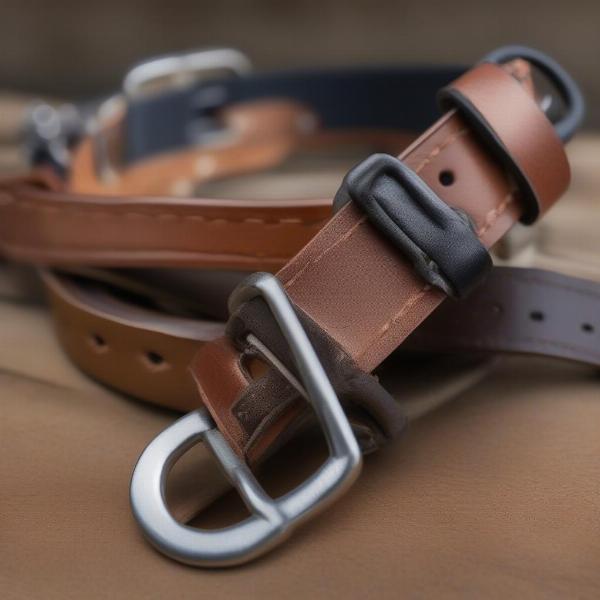Western dog collars, a staple in many canine wardrobes, offer both functionality and style. Whether you’re a seasoned dog owner or just starting out, understanding the different types, materials, and fitting techniques is essential for your dog’s comfort and safety. This guide will explore the world of western dog collars, helping you make informed decisions for your furry friend.
Choosing the right collar for your dog involves considering several factors, including their size, breed, activity level, and even personality. From basic everyday collars to specialized training tools, the options can seem overwhelming. This guide aims to simplify the selection process, providing you with practical advice and insights into the world of western dog collars.
Types of Western Dog Collars
Western dog collars come in various styles, each designed for specific purposes. Understanding these differences will help you choose the most suitable option for your dog’s needs.
- Standard Buckle Collars: These are the most common type, featuring a simple buckle closure. They are suitable for everyday wear and come in various materials and designs.
- Rolled Leather Collars: These collars are designed to prevent matting and hair breakage, particularly beneficial for long-haired breeds. The rolled design distributes pressure evenly, minimizing irritation.
- Braided Leather Collars: These collars offer a stylish and durable option, often featuring intricate braiding patterns. They are suitable for everyday wear and can add a touch of western flair.
- Chain Slip Collars: These collars tighten when pulled, offering control during training. However, they should be used with caution and under the guidance of a professional trainer to avoid choking or injury.
- Martingale Collars: These collars provide a limited slip action, offering more control than standard buckle collars but less than chain slip collars. They are a good option for dogs who tend to pull or slip out of their collars.
Materials and Construction
The materials used in western dog collars impact their durability, comfort, and overall appearance. Leather is a popular choice, known for its strength and classic aesthetic. Other materials include nylon, biothane, and even metal.
- Leather: Durable, stylish, and ages beautifully. Requires proper care to prevent drying or cracking.
- Nylon: Lightweight, affordable, and easy to clean. Offers a wide range of colors and patterns.
- Biothane: Waterproof, odor-resistant, and incredibly durable. A good option for active dogs or those who spend time in water.
- Metal: Often used for decorative accents or in combination with other materials. Can be heavy and potentially uncomfortable for some dogs.
Choosing a well-constructed collar is crucial for safety and longevity. Look for quality stitching, sturdy hardware, and materials that are appropriate for your dog’s lifestyle.
 Western Dog Collar Materials
Western Dog Collar Materials
Fitting Your Dog with a Western Collar
A properly fitted collar is essential for your dog’s comfort and safety. A collar that is too tight can restrict breathing and cause irritation, while a collar that is too loose can easily slip off.
- Two-Finger Rule: You should be able to fit two fingers comfortably between the collar and your dog’s neck. This ensures a snug fit without being too restrictive.
- Adjustability: Ensure the collar has enough adjustment holes to accommodate your dog’s growth or changes in weight.
- Comfort: Check for any signs of rubbing or irritation on your dog’s neck after wearing the collar.
Regularly check the fit of your dog’s collar, especially during periods of growth or weight fluctuations.
Conclusion
Choosing the right western dog collar involves considering your dog’s individual needs and preferences. By understanding the various types, materials, and fitting techniques, you can ensure your furry companion has a comfortable and stylish collar that enhances their safety and well-being. Western dog collars offer both practicality and aesthetic appeal, making them a popular choice for dog owners around the world.
FAQ
- What is the best type of western dog collar for a puppy? A lightweight, adjustable nylon or leather buckle collar is a good option for puppies.
- How often should I clean my dog’s collar? The frequency of cleaning depends on the material. Leather collars require occasional conditioning, while nylon collars can be washed more frequently.
- Can I use a western dog collar for training? Some western collars, like martingale collars, can be used for training. However, consult a professional trainer for guidance.
- Are rolled leather collars better for dogs with sensitive skin? Yes, rolled leather collars can help prevent irritation and hair breakage for dogs with sensitive skin.
- Where can I buy high-quality western dog collars? Specialty pet stores and online retailers offer a wide selection of western dog collars.
- What is the difference between a martingale collar and a chain slip collar? Martingale collars provide limited slip action, while chain slip collars tighten more significantly when pulled.
- How do I know if my dog’s collar is too tight? If you can’t fit two fingers comfortably between the collar and your dog’s neck, it’s too tight.
ILM Dog is a leading online resource for dog owners worldwide. We offer expert advice on dog breeds, health, training, nutrition, grooming, and much more. Our mission is to provide practical, trustworthy information to help you give your canine companion the best possible care. Whether you’re a seasoned dog owner or just starting your journey, ILM Dog is here to support you every step of the way. Learn more about our services and access valuable resources by visiting us at ILM Dog or contacting us at [email protected] or +44 20-3965-8624.